 |
 |
| View Mode |
| Regular | Headlines |
 |
| All times are
PT (Pacific Time), U.S.A.
|
 |
|
 |
|
 |
 |
| Planet Of The Apes The Television Series |
| Posted By: Thomas Rucki on May 11, 2015 - 4:00 AM |
|
|
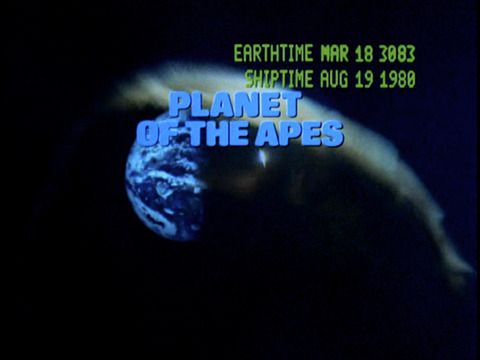
 We are going to examine the many scores of the science-fiction television series derived from the 1968 feature film Planet Of The Apes, composed by a quartet of artisans (leading maestro Lalo Schifrin followed by Earle Hagen, Richard LaSalle and 20th Century Fox music supervisor Lionel Newman) in 1974, by comparing the original recording and the actual music used and heard in the scenes of the series. It’s a music editor exercice and the tools of the trade are: the soundtrack CD (La-La Land Records, LLLCD 1336, 2015, Disc 1: 58 minutes 51 • Disc 2: 68 minutes 15, Disc 1: 50 tracks • Disc 2: 62 tracks, Limited Edition: 2.000 units, Liner Notes by Jeff Bond) and the DVD of the series (20th Century Fox, 644 minutes, Full Frame, 2001, English and French Languages, English and Spanish Subtitles, Scene Selection). We are going to examine the many scores of the science-fiction television series derived from the 1968 feature film Planet Of The Apes, composed by a quartet of artisans (leading maestro Lalo Schifrin followed by Earle Hagen, Richard LaSalle and 20th Century Fox music supervisor Lionel Newman) in 1974, by comparing the original recording and the actual music used and heard in the scenes of the series. It’s a music editor exercice and the tools of the trade are: the soundtrack CD (La-La Land Records, LLLCD 1336, 2015, Disc 1: 58 minutes 51 • Disc 2: 68 minutes 15, Disc 1: 50 tracks • Disc 2: 62 tracks, Limited Edition: 2.000 units, Liner Notes by Jeff Bond) and the DVD of the series (20th Century Fox, 644 minutes, Full Frame, 2001, English and French Languages, English and Spanish Subtitles, Scene Selection).
|
|
|
 THE·COMPOSERS THE·COMPOSERS |
|
|
|
Lalo·Schifrin
|
Two scores (“Escape from Tomorrow” and, especially, “The Good Seeds”) by Lalo Schifrin are an outgrowth of a Mission: Impossible score entitled “Submarine” (air date: January 16, 1970)—a powerful martial score foreshadowing the hectic and suspenseful side of Kelly's Heroes (release date: June 23, 1970)—and for the sake of the comparison, just replace the Eastern German police from “Submarine” by the gorillas mounted patrol. Some tracks from Schifrin’s Apes scores clearly follow the same MMM (Modern Military Minimalism) dominated by an extensive use of harp, strings, cimbalom, electric organ (Yamaha E-3 Electone), drum effects, fat brass section and low end piano. In the liner notes and on page 10, we learn that prior to Rosenman, Schifrin was asked to write the music for the second Apes feature film (Beneath The Planet of the Apes) but couldn’t do it because of a 1970 commission. Imagine for a moment a compromise of the experimental side of Mission: Impossible transposed into the Apes realm that I call Mission: Apes. In 1976, Schifrin will rework the Apes Urgency motif in a slower way for the 20th Century Fox actioner Sky Riders: see "The Riders" (from 05:22 to 05:49), "The Terrorists" (from 00:00 to 00:50).
|
|
|
|
|
The pilot score “Escape from Tomorrow” is acid and iron martial gorilla music with a touch of the bizarre (see “Spaceship” that highlights layers of sounds—produced by harp, vibraphone, flute—and ends up with the buzzing Yamaha organ a la “First Escape” from THX 1138 [release date: March 11, 1971]). Find a tight suspenseful violin-laden cue (from 00:11 to 01:46) in the track “Minefield” from Kelly's Heroes that is reworked in both the 1971 television score “Encore” from Mission: Impossible and in “Escape from Tomorrow”: see “Urko and Galen”, from 03:15 to 03:40.
|
|
|
|
The second score “The Gladiators” is divided in three directions: the sweet flute-oriented human side (“Wooden Area”, “Jason”—second part only—, “The Disc”, “A Beginning”), the percussion-oriented bestial game (“Brutal Fight”, “The Arena” featuring bare primitive drum rolls, “Wrestling in the Arena”) and the abstract and totalitarian apes (“Trouble with Apes”, “Planet of the Apes Mountains”, “Human Vs. Apes”—this arch-martial track contains the same intense arrangements from “Ringerman’s Chase” in the film score Coogan’s Bluff (release date: October 2, 1968). The buzzing organ sneaks into “Planet of the Apes Mountains”.
|
|
|
The last score “The Good Seeds” is the pinnacle of the Apes’ brutal style that is encapsulated in the dry crazy “Central City” (recycled in the pilot) but the score is slightly counterbalanced by a peaceful farmer leaning (“Plowing”, “Polar”, “Zanties”, “Virdon”—first part only—, “Twin Bulls”—first part only). Still in that blunt force score, Schifrin pays tribute to Rosenman’s Beneath The Planet of the Apes in the hardcore military apes march derived from “Off to War” and “Apes Soldiers Advancing” that you find in the series mounted patrol tracks “Riding for Urko”, “Travel Without Stars”, “Local Patrol” and “We Ride”—by sheer coincidence, both the second Apes feature film and the series highlight a gorilla general (Ursus, Urko). The extented version of “Riding for Urko” has again the intense arrangements from “Ringerman’s Chase” in the film score Coogan’s Bluff. The buzzing organ comes back full force in “Travel Without Stars”, “Local Patrol”, “I’ve Seen Him Before”, “We Ride”, “Discovered”.
|
|
|
|
|
Amongst Schifrin’s “modernistic” devices, find the following ones: the dissonant buzzing electric organ initiated in THX 1138, the weird ARP and Moog synthesizers, the echoplexed instruments, the Hungarian cibalom, minimalistic use of exotic instruments (from Brazil, Cuba, Indonesia), the suspense trick (harp and violin combo with pizzicato effect), the hard fisted strokes on a low register piano.
|
|
|
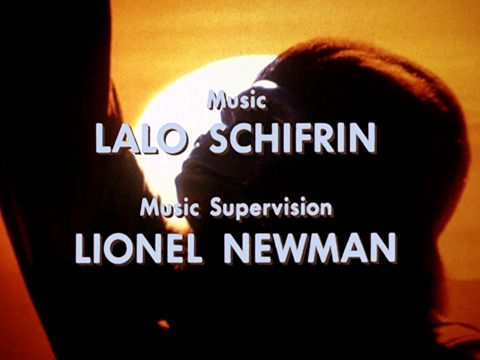 |
|
|
|
Earle·Hagen
|
|
After Schifrin’s masterful input, Hagen’s trio of scores are uniformally good and inspired. The first score (“The Legacy”) is rather faithful to the hard edge spirit of Schifrin’s Apes sound but it’s the companion piece to LaSalle’s “The Trap” and it also contains lovely or tender music to illustrate the surroundings of the three fugitives (the hills in “Country Style”, the ravaged Oakland in “Ruined City”) and astronaut Alan Virdon’s surrogate family: a treacherous hungry kid on the payroll for the gorillas and a poor woman cooking (“The Kid”, “Virdon and The Kid”, “The Family”, “The Kid’s Toy”, “Kids and Apes”—first part only—, “Farm Girl”, “Apes and Kids”—second part only).
|
|
|
|
The most poetic and ethereal score remains the unreleased “Tomorrow’s Tide” with its strange pagan fisherman feel (“The Village”—a lowkey moody track that is constantly recycled to depict human villages—, “Gato Leaves”, “Escape”) and evocative “atmospheric underwater music”: see “The Shark”, “Sharks”. Oddly enough, the composer fashions some corrida music for the aquatic ordeal: see “Fire and Fish”, “More Fine Divers”, “Peter Dives”. The main theme is upbeat, sunny and pastoral: see “Runners”, “Run Off”.
|
|
|
|
Earle Hagen’s mini score for “The Surgeon” is fantastic, creepy, uncanny and experimental because of the instruments’ use (scrapped cymbals and cuika, modulator and occilator, synthesizers, electric organ, hand percussions) and consists of two tracks only.
|
|
|
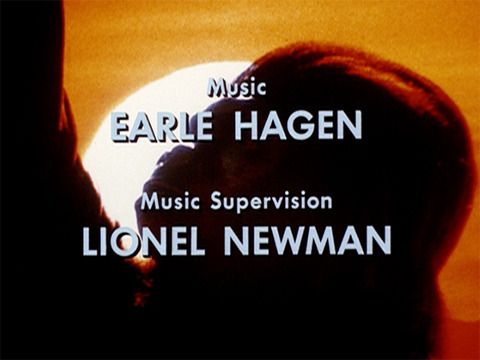 |
|
|
|
Richard·LaSalle
|
|
The next unreleased score “The Trap” is a homage to Jerry Goldsmith’s Planet of the Apes, especially in tracks like “Through The Forest” (a rework of Goldsmith’s “No Escape” that depicts the way to the human village of Numai) and “Hunted”—that both features vibraslap and guiro combined with echoplexed instruments—and “Stalk in the City” (a rework of Goldsmith’s “New Identity”) and “The Bag”. There is a recursive echoplexed harp gimmick all over.
|
|
|
|
The 8 tracks score “The Deception” is delicate dreamlike melancholic music dedicated to a blind farmer female ape that is declined through a variation of a character theme (“Farna Theme”) that refer to Goldsmith’s “The Revelation” (the last intimistic part) from Planet of the Apes and Herrmann’s Vertigo because of the dominating harp and woodwinds. The score is also blended in the finished episode with Schifrin’s aggressive tracks from “Escape from Tomorrow” and “The Good Seeds” that depict the criminal deeds of a masked apes’ militia. The Farna Theme is tracked once in “The Liberator” during an intimate human family meeting.
|
|
|
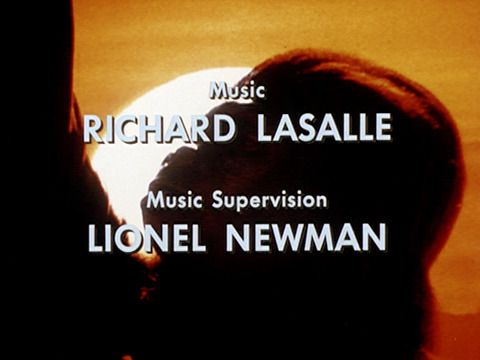 |
|
|
|
Lionel·Newman
|
|
Newman’s 4 tracks score for “The Interrogation” is a caleidoscope of mood/source music from easy listening (see “Again” as a counterpoint) to bare instruments performances, mostly percussions. Newman’s most experimental and far out track remains “Drums and Bells” fashioned for the brainwashing (a silver reflector and loud percussions) of astronaut Pete Burke who exclaims: “All those bells and drums are too loud. They’re deafening me”. As in the previous two mini scores, the story revolves again around a female ape and, here, a psychologist-torturer hence the austere music but one key scene uses two tracks back-to-back: “Again”—Pete Burke dreams of his girlfriend, lying in the meadow—and “Mish Mosh”—Pete Burke awakes and rejects the kiss of the female ape scientist posing as his girlfriend. The music supervisor even tracks Earle Hagen’s “The Surgeon” just before “Again”. Stock music-wise, the track “Drums and Bells” is perfectly recycled in the human sacrifice in the temple scene from the episode “The Liberator”.
|
|
|
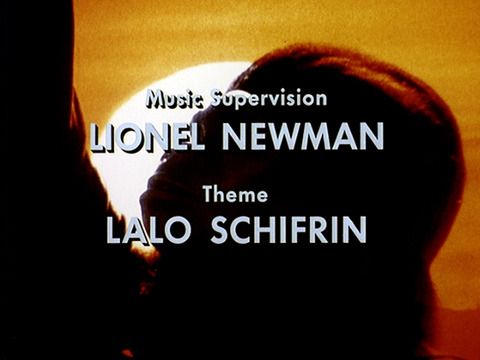 |
|
|
 KEY·APES·TRACKS KEY·APES·TRACKS |
|
Some Schifrin’s tracks are over-used by the music supervisor and generally are signal cues for a gorilla soldiers mounted patrol: from “Escape from Tomorrow”, one single piece is noticeable “Apes Urgency” and from “The Good Seeds”, you find “Riding for Urko”—the most tracked piece of aggressive apes music, according to Jeff Bond on page 16—, “Travel Without Stars”, “Local Patrol”, “Apes Neutral Suspense”—a sneaky signal track dominated by Gamelan metallophone percussions and tense strings and used when one of the fugitive characters sense the arrival of a gorillas patrol; the signal returns in “Wind Mill”—, “We Ride”, “The Riding Enemy”, “Hunting Bonded Humans”. “The Soldiers”—a tribute to Schifrin’s “Apes Urgency” from “Escape from Tomorrow”—and “Apes Signals” from Earle Hagen’s “The Legacy” are other typical gorilla soldiers pieces.
|
|
|
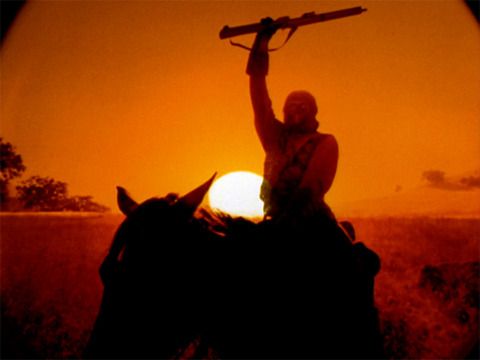 |
|
|
|
The most iconic distorted piece remain “Reflections” from Richard LaSalle’s “The Trap” that is the template for signal cues that Jeff Bond describes as “the echoplex effects along with a descending tone from water drop bars to characterize the glint of the signaling reflector in use by the apes”. Hagen’s answer to LaSalle’s “Reflections” becomes “Ape Signals”—first part only—from “The Legacy” but keep in mind that Schifrin previously provides “Planet of the Apes Mountains”—first part only—from “The Gladiators”.
|
|
|
|
|
|
“The echoplex effects along with a descending tone from water drop bars to characterize the glint of the signaling reflector in use by the apes”.
|
|
About the track "Reflections" by Richard LaSalle.
|
|
|
|
|
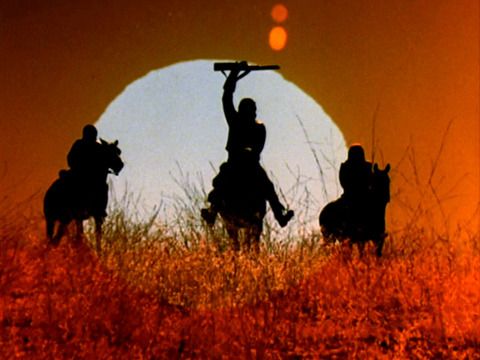 |
|
|
|
The leading ape characters have their specific music: renegade Galen (“Urko and Galen” from “Escape from Tomorrow”), General Urko (“Riding for Urko” from “The Gladiators” and Hagen’s answer becomes “Apes Signals”—second part only—from “The Legacy”, “Urko” from “The Legacy”), scientist Zaius (“Prison Cell/Zaius” from “Escape from Tomorrow”).
|
|
|
 COMPARATIVE·STUDY COMPARATIVE·STUDY |
|
|
|
Intrada·Edition [2005]
|
|
Two onscreen credits scores are omitted: Richard LaSalle’s “The Trap” and Earle Hagen’s “Tomorrow’s Tide”. The tracks are suites. The booklet doesn’t mention any hints of musical informations: an oddity. The only added value is in track #31 entitled “End Titles” that features the 20th Century Fox anthem at 00:29 followed by a man talking to a musican and a laconic solo of primitive horn from 00:54 to 01:57 (include in “The Gladiators” when a human villager plays to announce the game).
|
|
|
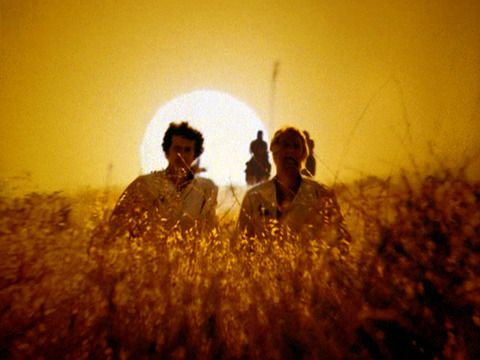 |
|
|
|
La-La Land·Edition [2015]
|
|
All the six onscreen credits scores are available combined with three uncredited mini scores or partial scores—these three mavericks have the generic onscreen credits “Music Supervision Lionel Newman”. All Lalo Schifrin’s scores, especially “The Good Seeds”—with more than five minutes—, and Earle Hagen’s “The Legacy” feature new and longer materials and alternate mixes: Intrada and La-La Land timings for “Escape from Tomorrow” are INT19:01 against LLL19:59, for “The Gladiators” are INT16:28 against LLL16:40, for “The Good Seeds” are INT13:16 against LLL18:18 and, lastly, for “The Legacy” are INT16:36 against LLL17:05.
|
|
|
|
And the sherry on top of the cake remains the two versions of the cult heavy martial “Riding with Urko” (one from the score, lasting 01:48, and one extented, lasting 01:55). The liner notes by Jeff Bond is a vast improvement and provides a wide array of musical descriptions and therefore allow people to gain an understanding of the complex mechanism of composition. The track titles have been modified: for instance, from “Escape from Tomorrow”, the track “Apes” (02:48) in 2005 turns into “Apes Urgency” (01:31) in 2015 because they have separated the cues instead of the previous suite and it means that “Apes” combines two cues (“Apes Urgency” and “Concealment”). This cue by cue listing from LLL is much more realistic and relevant.
|
|
|
|
Notes |
|
For the anecdote, the label offers the list of musicians classified by the families of instruments and, as usual in most liner notes, some families of instruments would deserve to be carefully detailed: for instance Percussions and Keyboards which lead the peculiar identity of this unconventional music. Furthermore, a deep analysis on the achieved sound devices should be fully explained in that particular decade of musical composition: the subversive seventies.
|
|
|
|
Footnotes |
|
INT stands for the label Intrada.
LLL stands for the label La-La Land.
|
|
|
|
|
|
|

|
 |
|
 |
 |
 |
 |
 |
 |
 |
Today in Film Score History:
April 23 |
 |
| Alain Jomy born (1941) |
 |
| Andre Previn begins recording his score for The Fastest Gun Alive (1956) |
 |
| Arthur B. Rubinstein died (2018) |
 |
| Bernard Herrmann begins recording his North by Northwest score (1959) |
 |
| Christopher Komeda died (1969) |
 |
| Harold Arlen died (1986) |
 |
| Hilmar Orn Hilmarsson born (1958) |
 |
| James Horner begins recording his score for House of Cards (1992) |
 |
| Jay Gruska born (1952) |
 |
| Jonsi born (1975) |
 |
| Kenji Kawai born (1957) |
 |
| Louis Barron born (1920) |
 |
| Patrick Williams born (1939) |
 |
| Robert Farnon died (2005) |
 |
| Satyajit Ray died (1992) |
 |
| Sergei Prokofiev born (1891) |
 |
 |
|
|
 |
|
























